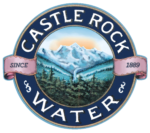Do you know what TDS means, and how it might affect your drinking water?
TDS in water stands for “Total Dissolved Solids,” and can have a significant impact on the taste, smell, and overall quality of drinking water.
Total Dissolved Solids are the total amount of minerals, salts, or metals dissolved in a given volume of water, expressed in units of parts per million (ppm). TDS is directly related to the purity of water, as some dissolved solids come from some pretty disgusting places.
Organic sources such as leaves, silt, plankton, and even industrial waste and sewage can contribute to the TDS level in water. Other sources come from runoff from urban areas, road salts, fertilizers, and pesticides used on lawns and farms. Those are often the types of TDS found in tap water.
Dissolved solids also come from inorganic materials such as rocks and air that may contain calcium bicarbonate, nitrogen, iron phosphorous, sulfur, and other minerals.
Castle Rock Water’s TDS levels are low because it is such a pure spring water. Many people are sensitive to higher TDS levels, and even to minerals that are found in some some bottled waters. Those people need a pure spring water, and Castle Rock Water is as pure as it gets.
Everyone is affected by toxic minerals and chemicals found in the air and in our food on a daily basis. Water is the only way our bodies have to flush out these toxins. The purer the water is to start with, the higher its capacity to collect and cleanse these compounds from the body.
Then there’s this to think about:
If a person drinks two pints of water a day, this will total 4,500 gallons of water passing through the body over a 70 year span. If the water is not totally pure, those 4,500 gallons will include 200-300 pounds of rock that the body cannot utilize. Most of that will be eliminated, but some can stay in the body, causing stiffness in the joints, hardening of the arteries, kidney stones, gall stones and blockages of arteries, microscopic capillaries and other passages in which liquids flow through our entire body.
Why risk it? Our bodies require water to live, and the purer the water we drink, the healthier our bodies will be.

